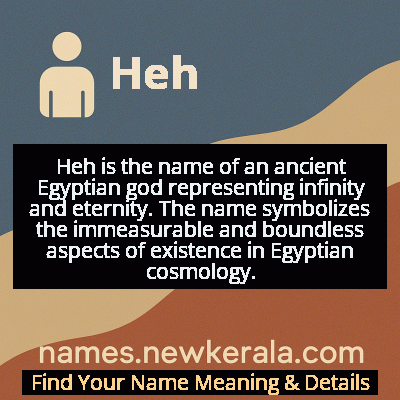Heh Name Meaning & Details
Origin, Popularity, Numerology Analysis & Name Meaning of Heh
Discover the origin, meaning, and cultural significance of the name HEH. Delve into its historical roots and explore the lasting impact it has had on communities and traditions.
Name
Heh
Gender
Male
Origin
Egyptian
Lucky Number
3
Meaning of the Name - Heh
Heh is the name of an ancient Egyptian god representing infinity and eternity. The name symbolizes the immeasurable and boundless aspects of existence in Egyptian cosmology.
Heh - Complete Numerology Analysis
Your Numerology Number
Based on Pythagorean Numerology System
Ruling Planet
Jupiter
Positive Nature
Optimistic, inspirational, and creative.
Negative Traits
Scattered, exaggerating.
Lucky Colours
Yellow, gold, purple.
Lucky Days
Thursday.
Lucky Stones
Yellow sapphire.
Harmony Numbers
1, 2, 9.
Best Suited Professions
Arts, writing, communication.
What People Like About You
Creativity, optimism.
Famous People Named Heh
Heh
Ancient Egyptian deity
Personification of infinity and eternity in Egyptian cosmology
Heh (as depicted in art)
Mythological figure
Represented holding notched palm ribs symbolizing long life and years
Heh (in temple inscriptions)
Divine being
Featured in hieroglyphic texts as part of royal titulary and cosmological diagrams
Name Variations & International Equivalents
Click on blue names to explore their detailed meanings. Gray names with will be available soon.
Cultural & Historical Significance
Extended Personality Analysis
Those bearing the name Heh are typically characterized by their profound depth of thought and exceptional capacity for long-term perspective. They possess an innate understanding of cycles, patterns, and the bigger picture that allows them to navigate life with remarkable wisdom and patience. Their personality often reflects the eternal qualities of their namesake—they are steady, reliable, and consistent in their relationships and endeavors. However, this focus on the infinite can sometimes manifest as detachment from immediate concerns or difficulty with spontaneity. They excel in roles requiring strategic planning, philosophical contemplation, or enduring commitment. Their strength lies in their ability to weather storms and maintain equilibrium through challenging times, much like the eternal nature they represent. While they may not be the most emotionally expressive individuals, they offer a grounding presence and deep loyalty that makes them valued companions and advisors. Their contemplative nature often leads them to careers in academia, research, philosophy, or any field requiring long-term vision and systematic thinking.
Modern Usage & Popularity
In contemporary naming practices, Heh remains an exceptionally rare choice, primarily confined to academic circles, Egyptian cultural revival movements, and families with deep connections to Egyptology. The name has never appeared on mainstream baby name charts and maintains its status as a mythological reference rather than a practical given name. However, it experiences periodic revivals in niche communities interested in ancient Egyptian spirituality or Afrocentric naming traditions. The name's complexity and unfamiliar pronunciation to most modern speakers present significant barriers to widespread adoption. Despite this obscurity, Heh continues to appear in scholarly publications, museum exhibitions, and popular media about ancient Egypt, ensuring its cultural preservation. Some modern spiritual practitioners incorporating Egyptian deities into their practices may use the name in ritual contexts or for children born within these traditions, though such usage remains extremely limited and specialized.
Symbolic & Spiritual Meanings
The name Heh carries rich symbolic meanings centered on concepts of infinity, eternity, and the boundless nature of existence. Symbolically, it represents the human aspiration to transcend temporal limitations and connect with eternal truths. The palm ribs traditionally depicted with Heh serve as powerful symbols of measured time and the achievement of longevity, making the name associated with endurance, persistence, and the accumulation of wisdom through ages. Metaphorically, Heh embodies the tension between the finite human experience and the infinite cosmic reality, serving as a bridge between mortal concerns and divine timelessness. The deity's frequent depiction in kneeling position symbolizes both reverence for the infinite and the stability required to support eternal concepts. In broader symbolic terms, the name connects to themes of cosmic order, cyclical time, and the eternal return—concepts that resonate across multiple philosophical and spiritual traditions. The symbolic weight of Heh makes it a name that carries profound metaphysical implications beyond its mythological origins.

